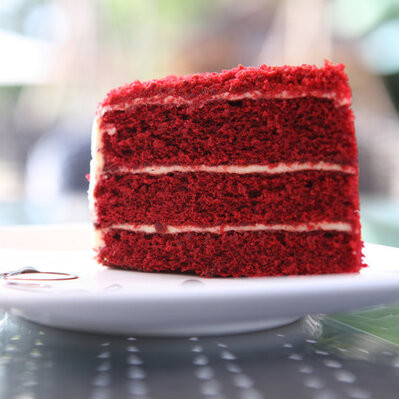
Red Velvet Cake
What is Red Velvet Cake?
Red velvet cake is a delicious cake often covered with sweet cream cheese frosting. The name “Red Velvet” is a reflection of its characteristic deep red or burgundy color and its smooth texture.1
The recipe for red velvet cakes has won the hearts of dessert lovers, and today we find it in various formats such as:
- Cupcakes
- Ice cream
- Truffles
Origin
There are several theories and urban legends on how the red velvet cake was created. One of the theories suggests that its origin dates back to the 19th century, where cocoa was used to soften the texture of cakes and for this reason they were called “velvets”.
Another story claims that cake came about during World War II as food was highly rationed and bakers used beet juice to improve the color of their cakes and improve their yield since it kept the cakes moist.
How red velvet cake is made
Traditional red velvet cakes are usually made using kitchen ingredients that are familiar to the consumer. The creaming method is in most cases the preferred mixing method to create highly aerated products.
Typical formulation of a red velvet cupcake
| Ingredient | Baker’s % (based on flour weight) |
|---|---|
| Creaming stage | Creaming stage |
| Butter* | 50.0 |
| Refined, granulated sugar | 100.0 |
| Salt | 1.0 |
| Red food color | 3.0 |
| Liquids addition | Liquids addition |
| Liquid whole eggs** | 35.0 |
| Buttermilk*** | 100.0 |
| Vinegar | 5.0 |
| Solids addition | Solids addition |
| Cake flour | 100.0 |
| Cocoa | 6.0 |
| Baking powder | 2.0 |
| Baking soda | 2.0 |
| Total | 404.0 |
Total formula hydration: 123.0%
*Water content, 20%
**Water content, 75%
***Water content, 87%
Processing
- Creaming and mixing
- Depositing
- Baking
- Cooling
- Serving
Application
Ingredient considerations
- Beet juice can be used in place of food coloring, although quantity may have to be adjusted to get the desired color intensity.
- Buttermilk is rich in fast-acting leavening acids, such as lactic and citric which may prematurely react with sodium bicarbonate. This causes excessive aeration of the batter in the mixer and poor oven spring. Quick processing prior to baking is critical to preserve CO2 production for optimum oven spring.
- The flour used in cakes baked in the US is invariably chlorinated soft wheat flour. When starch in flour is chlorinated, it is able to swell to a greater extent and hence raises the viscosity of the batter more than does an unchlorinated flour. When using unchlorinated flour, gums or modified starches are recommended to increase batter viscosity.
References
- Lam, F. The evolution of red velvet cake, an iconic American dessert. The Splendid Table. 06-10-2017.

